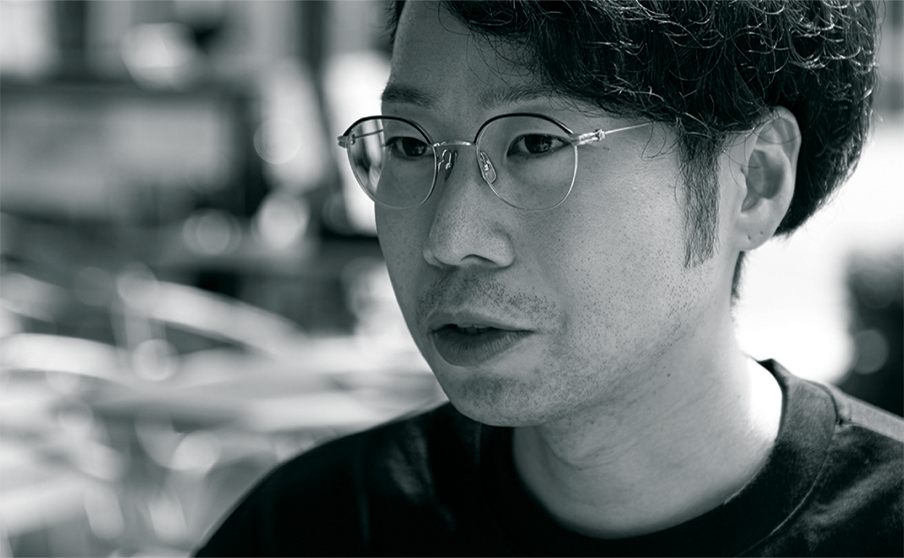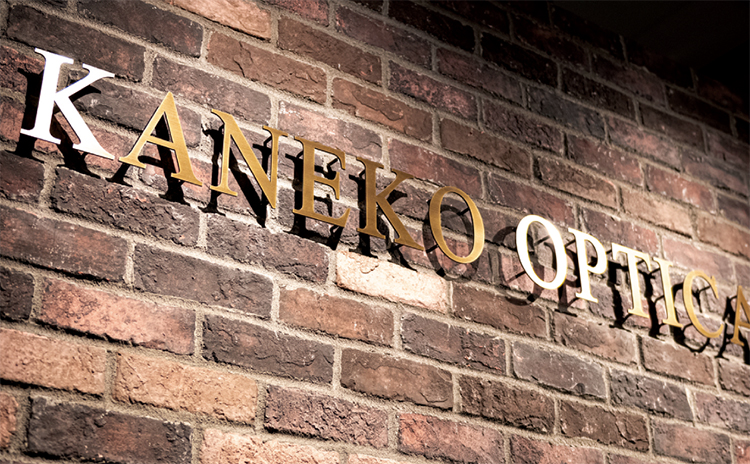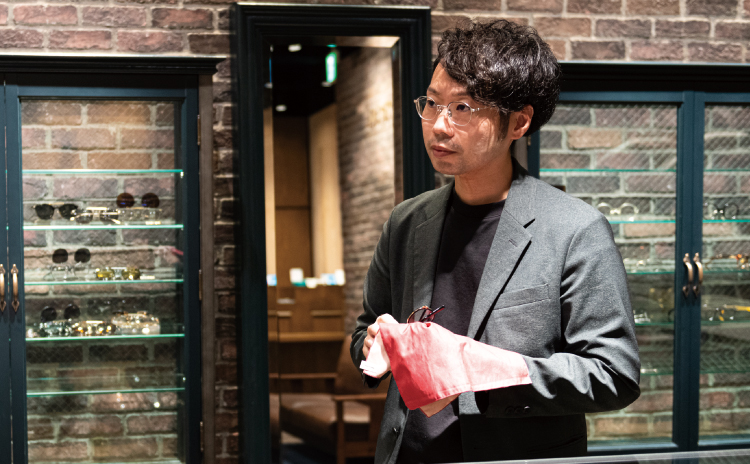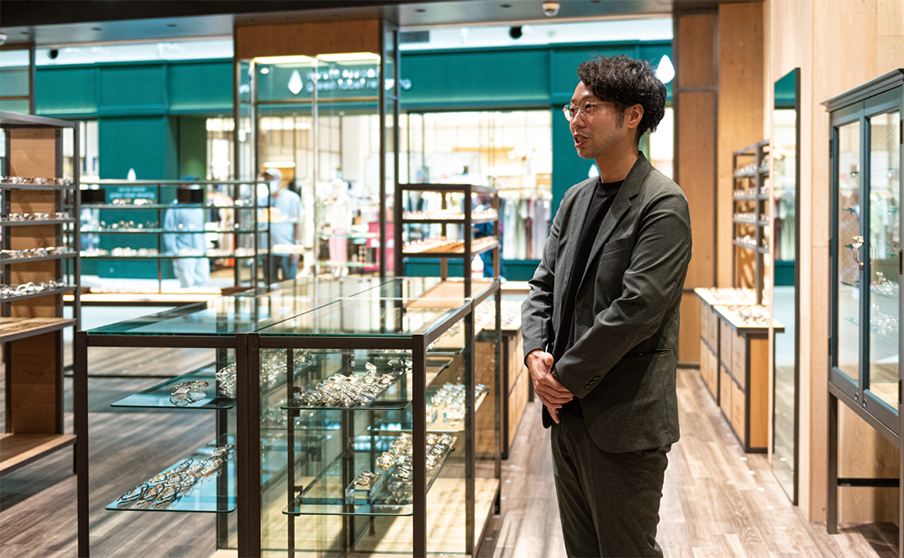KANEKO OPTICAL ららぽーと豊洲店 店長
林 智行

Failures and setbacks at work can change a person's whole direction in life. The damage done, if left unhealed, may lead a person to disappear behind the scenes, or in other cases nourish them and stimulate self-reflection, leading to great leaps on the stage of life. For Toshiyuki Hayashi, who since joining the company has worked at 7 stores, and is currently store manager at the KANEKO OPTICAL LaLaport Toyosu store, his greatest strength is his own history of repeated failures and the lessons he's learned from them. He sizes himself up as an "ordinary man with no redeeming features." Back in school, he followed the pack in academics, graduation, and job hunting. That he could somehow keep up was more a reflection of the support he got from those around him than his own efforts. "The fact that I'm here now, despite all my failures and setbacks, is thanks to the help I got from others." For Hayashi this is an indisputable and heartfelt reality.
Hayashi was born and raised in Tokyo. Problems already awaited him by the time he got to high school. "I couldn't get used to the classes, so I started to skip school here and there. I wasn't withdrawn – I would hang out with friends from middle school in the same situation as me. I wasn't a bad kid by any means. But I didn't stand out. I had no particular personality, or anything that shined about me, like sports or some special skill. My grades were poor and I didn't go to school. There was nothing about me anyone would appreciate." Somehow he managed to make it to his last year, but his poor grades and many absences put his chances of graduating and getting into college at risk. Just in the nick of time, Hayashi got a fire in his belly and began to study, enrolling in extra classes early in the morning and at night. Classmates with good grades and young teachers who saw Hayashi pour himself in to his work now began to support him, even joining in him in study sessions.
Encouraged by those around him, Hayashi got into college, but his old habit of cutting class showed its face again, and before graduation he realized he was short of credits. "I was beyond help!" (Hayashi laughs). He managed to graduate by getting credit for volunteer work, but since he was so preoccupied with trying to graduate, he had no time for job hunting. Realizing he was in trouble, Hayashi went to the university career center, where a young woman gave him a great hint. "She asked me, 'What do you like?' I said,'I like people who wear glasses,' as though it was a joke, but my answer was actually true. She said, 'Well then, make that your job!' It took me by surprise, because I'd never thought of this. But it did feel like a light switched on in my head: 'Maybe this could work...' The young lady told me, 'If it doesn't work out, you're young, you can always look for something else.' I felt amazingly lighthearted."
Once again, with the help of others, Hayashi had a new option in life - to join the world of eyeglasses.
3.11: a turning point.
After college graduation in the spring of 2006, Hayashi got a part-time job in a Kaneko store that had just opened in Kinshicho, Tokyo. Jumping headfirst into the business, he was amazed by all the edgy, creative people around him. The store was constantly busy, so he could watch and learn by following the examples of experienced co-workers as he served customers. Two and half years after becoming a full-time employee, Hayashi was transferred to the Maihama store. His skills improved and he gained some confidence. He felt on top of the world. But heartbreak was around the corner.
"I was asked be second in command under the store manager, but the only thing I had done up to then was serve customers and sell, so I was completely unprepared for the the store management and merchandising work that I was now being challenged to do. The difference in abilities between me and the other staff was glaring. One day the store manager asked me the one question I most wanted to avoid: 'What exactly were you doing before this?' This was the thing I'd been most painfully aware of, and when it was suddenly thrown in my face, I completely lost confidence. At that point I'd been out in the working world for 3 or 4 years. I had friends from college who'd also run into brick walls and gotten depressed. Some of them had changed jobs, and I was influenced by that as well, so I finally came to the conclusion that I should quit. I even called the president directly to tell him I wanted to leave the company, and my date of departure was more or less decided. But then a few weeks later, the 2011 Great East Japan Earthquake struck." It was an unprecedented event for KANEKO OPTICAL, and a major turning point for Hayashi.
March 11, 2011, 2:46pm. Immediately following the earthquake, Tokyo's transportation networks, including all railway and subway lines, came to a complete standstill. Starting that night, service slowly resumed, but no one knew how long a full restoration would take. Hayashi was fortunate to live in a less impacted area, so he went to work on the help team which was filling in for staff unable to get to their stores in the city center. This led to encounters with colleagues he might otherwise never have met. He could see the passion that each of them brought to their work, and it was revealing to observe how diverse the stores were in their atmosphere and world views. As the day of his planned resignation approached, his feelings of hesitation grew. It dawned on him that KANEKO OPTICAL was a far more caring place than he had realized.
"One day I got a long email from the manager of another store who was part of that help team. He said, 'When I watch you talking to customers, they look like they're enjoying themselves, and you yourself really look happy in your work. Do you really want to quit? Don't you think this is your true calling?'"
Why am I doing this job? What do I want to accomplish at this company? Things that had been only vague notions now became clear. Grateful to the coworkers who had spurred his awareness, and to the president who was willing to keep him on after he'd announced his resignation, Hayashi decided to retract his request and make a new start at the job.
The baton that connects
Having decided that this job is his calling, Hayashi recalls a story that's stayed with him from long ago. "Back when I was a student, I started to think about fashion, and set out to visit a certain men's shop in Harajuku. This was a pretty tony store, so I got some money together and was very enthused about going. But maybe because I looked out of place in the clothes I was wearing, not one of the shop staff spoke to me. They gave me that look of 'this guy is never going to buy anything,' and totally ignored me. I still wanted a jacket, though, so I found one I liked and asked for it. The salesman looked down his nose and said, 'You probably shouldn't buy that.' This was a traumatic experience for me, and one I never want to forget when I talk to customers."
"One day when I was working at our Kichijoji store, a junior high school student on his way home from school came in. At first he seemed very shy and couldn't even speak, but slowly he opened up, and we began to converse. He didn't buy anything that day, but a week later he came back with his mother and purchased a pair of glasses. He said, 'thanks for listening to me the other day.' And his mother told me, 'this boy told me he really wanted to buy glasses from that man in the (KANEKO OPTICAL) store, so we came.' I was so happy to hear this. If I had treated that junior high schooler the way I was treated back in Harajuku, I would have tarnished the KANEKO OPTICAL reputation, which the president and all my coworkers have worked so many decades to build, and wasted their good efforts. Not to mention the disservice I would do to all my colleagues in our stores across the country."
Hayashi's conclusion is that even if a customer he serves ends up leaving the store without buying anything, that should in no way disturb him. It's enough if the customer leaves the store thinking "Kaneko's glasses really are great," or "I so want them someday." It might well be that his good service leads a customer to end up buying from another KANEKO OPTICAL store. And the reverse can also happen -- that the glasses he sells today might be due to the earlier efforts of staff in some other store. Serving customers is like passing a baton -- a baton that connects from coworkers in other stores to us. What could be better than someone finding eyeglasses they love through that process? This is what keeps Hayashi at his post in the store.
PROFILE
Tomoyuki Hayashi
Born in Koto-ku, Tokyo. After graduating from college, he began working part-time at the newly opened Kinshicho store. Later he became a full-time employee, gaining experience at 4 stores, then participated as store manager in the opening of the KANEKO OPTICAL Shibuya Hikarie ShinQs store in June 2017. He currently manages the KANEKO OPTICAL LaLaport Toyosu store.




Hayashi was born and raised in Tokyo. Problems already awaited him by the time he got to high school. "I couldn't get used to the classes, so I started to skip school here and there. I wasn't withdrawn – I would hang out with friends from middle school in the same situation as me. I wasn't a bad kid by any means. But I didn't stand out. I had no particular personality, or anything that shined about me, like sports or some special skill. My grades were poor and I didn't go to school. There was nothing about me anyone would appreciate." Somehow he managed to make it to his last year, but his poor grades and many absences put his chances of graduating and getting into college at risk. Just in the nick of time, Hayashi got a fire in his belly and began to study, enrolling in extra classes early in the morning and at night. Classmates with good grades and young teachers who saw Hayashi pour himself in to his work now began to support him, even joining in him in study sessions.
Encouraged by those around him, Hayashi got into college, but his old habit of cutting class showed its face again, and before graduation he realized he was short of credits. "I was beyond help!" (Hayashi laughs). He managed to graduate by getting credit for volunteer work, but since he was so preoccupied with trying to graduate, he had no time for job hunting. Realizing he was in trouble, Hayashi went to the university career center, where a young woman gave him a great hint. "She asked me, 'What do you like?' I said,'I like people who wear glasses,' as though it was a joke, but my answer was actually true. She said, 'Well then, make that your job!' It took me by surprise, because I'd never thought of this. But it did feel like a light switched on in my head: 'Maybe this could work...' The young lady told me, 'If it doesn't work out, you're young, you can always look for something else.' I felt amazingly lighthearted."
Once again, with the help of others, Hayashi had a new option in life - to join the world of eyeglasses.